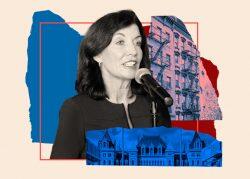Gov. Kathy Hochul on Tuesday night called the state Legislature back into session tomorrow to extend the state’s eviction moratorium through Jan. 15.
The announcement came six hours before New York’s stripped-down eviction ban will expire.
“We are not going to exacerbate what is already a crisis in terms of the homelessness problem,” the governor said at a press conference. Hochul faulted the state for failing to disperse more of the money allocated for rent relief.
Most New York tenants have been exposed to housing court since mid-August when a Supreme Court ruling tossed out a clause in the state ban that allowed tenants to self-declare hardship during Covid and avoid eviction.
The ruling creates a hurdle for lawmakers, which will have to craft legislation that can keep tenants out of court while also allowing landlords to contest a hardship form through the court — a legal brain teaser, if not a Catch-22.
The governor did not provide specifics as to how the legislature would reconcile that conflict. She said the state’s lawyers are working on it.
“We’ll make it as airtight as we can,” she said.
Landlords have become increasingly exasperated by repeated extensions of state and federal eviction moratoriums. New York tenants collectively owe billions of dollars in rent, and know landlords are without recourse to collect it — for now, at least. They could eventually seek rent arrears in court, but that is an expensive and time-consuming process with no guarantee that judgments can be collected.
Tenant advocates, meanwhile, have said it would be unconscionable to allow renters to be removed from their homes during a pandemic that cost many of them their jobs. They predict a tsunami of evictions should the moratorium expire — an assertion landlord groups dispute, given the cost of pursuing evictions.
The economy has largely recovered, but some tenants owe more rent than they can imagine repaying, and many small landlords have run through their savings and cannot afford lawyers.
Hochul said she expected the $2.7 billion in federal rent aid allocated to New York will solve the problem.
“The money is intended for landlords. They’re the ones who are owed the rent,” she said. “I want to make sure that we wipe the slate clean for landlords and for tenants.”
To speed distribution of that money, the governor said she would hire people to go door-to-door, recruiting landlords and tenants to apply for rent aid and helping them fill out the paperwork. “We’re going to have a SWAT team approach to actually go to people’s homes,” she said.
As of Sept. 1, only a couple of degrees of eviction protection will remain for the state’s renters.
Tenants who apply to the state’s rent relief program are protected from eviction for the year after their application is accepted; however, applying does not keep tenants out of court.
The Tenant Safe Harbor Act also provides protection, but only before a judge. Tenants can claim financial hardship experienced between March 2020 and January 2021 as a defense in an eviction proceeding.
Jay Martin, executive director of landlord group the Community Housing Improvement Program, has underscored that those protections should be sufficient.
The Rent Stabilization Association has threatened to sue for damages if a new ban contradicts any portion of the Supreme Court’s ruling.
Read more


